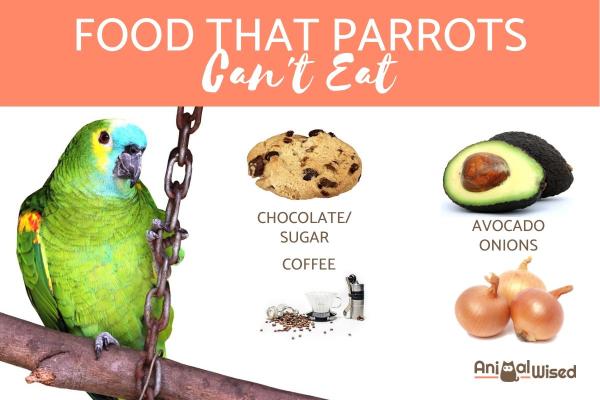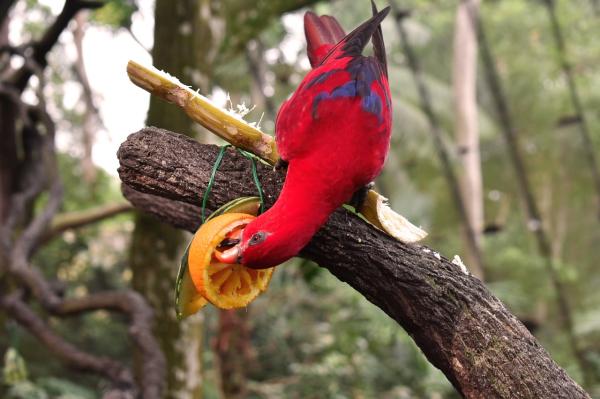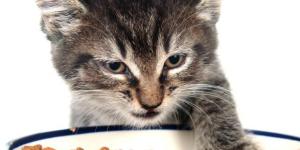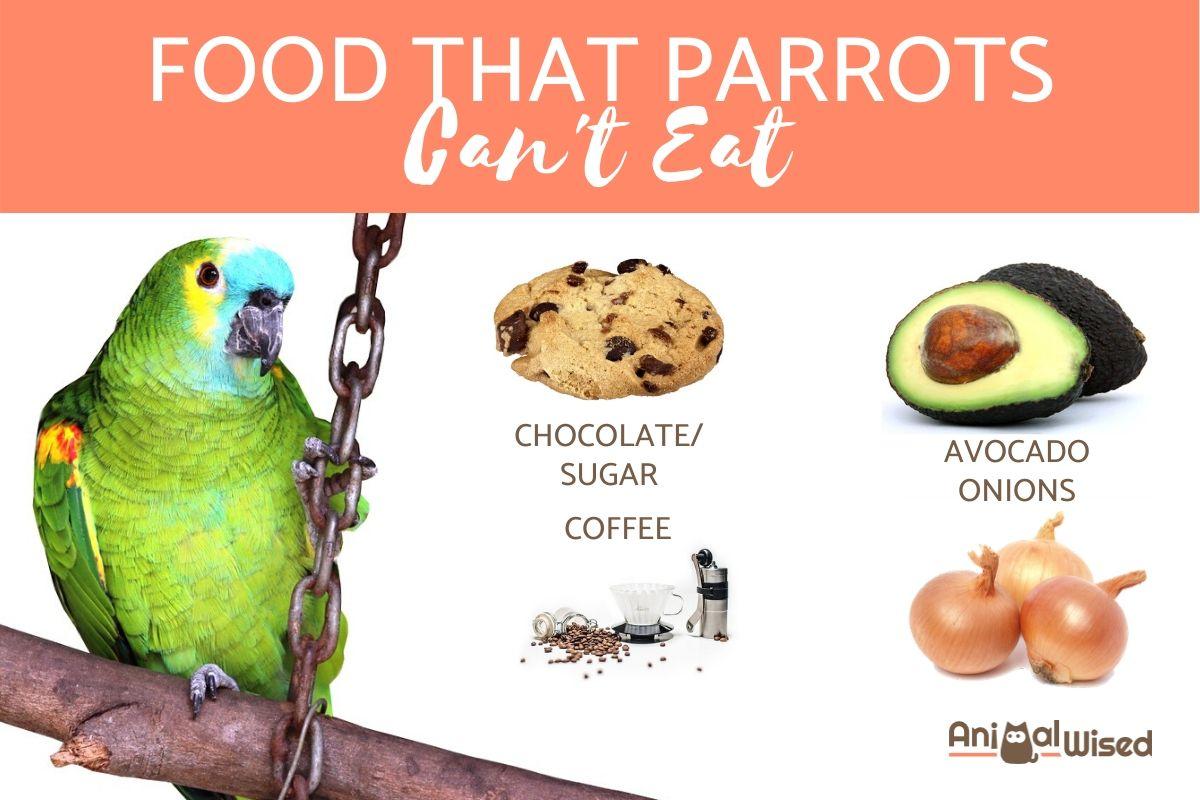Forbidden Food for Parrots


Parrots are not a species, but a family of birds. Their scientific name is Psittacidae. This group contains approximately 300 species which possess similar characteristics. The family is subdivided into two subfamilies, Psittacinae (Afrotropical parrots) and Arinae (Neotropical parrots) depending on the geographical origins of each species.
Nowadays many people consider parrots to be exceptional pets, their most noticeable characteristic being their beautiful multi-colored plumage. If you decide to bring an animal into your home, you must know that regardless of the chosen species, it will need care and a specific diet in order for it to be healthy and happy.
In order to help you, here at AnimalWised we have an article on the forbidden food for parrots.
What do parrots eat?
If you've decided to adopt a parrot, you should be aware that it's as important to know the food that parrots can't eat as it is to know the food that should be included in their normal diet. This way, you'll be able to meet all of your pet's nutritional requirements which will result in a good state of health and a longer and happier life.
You may have some specific questions such as can parrots eat pineapple? Here we show you the different food groups and some specific foods your parrot needs for a complete and balanced diet:
- Fruit: Parrots can eat any kind of fruit including apples, oranges, pears, apricots, melons, strawberries, tangerines, grapefruits and bananas, among others. You should take into account that you need to provide it with a mixture of at least 3 different fruits every day, and that you should regularly change the combination so that it doesn't consume an excess of one fruit in particular - especially those which are high in sugars.
- Vegetables should also be part of a parrot's daily diet. You can give it spinach, broccoli, chard, endive, carrots, radishes, spring garlic, celery stalks and peppers. As in the case of fruits, it's very important to keep them varied.
- Dry bird food: Whilst not essential, it comes highly recommended to supplement the parrot's diet with dry bird food. It should be specifically designed for Psittacidae.
- Seeds:shouldn't be given as often as fruits or vegetables, but they're equally important. You can feed your parrot dry seeds and bean sprouts.
Learn more about fruits and vegetables for parrots here.
Forbidden food for parrots
You should take into account the characteristics of your parrot's digestive system when deciding on what food to feed it. It's very important to prevent your pet from eating food that can be poisonous or cause multiple and dangerous adverse effects.
If you want to keep your parrot in a good condition, stop it from ingesting any of the following forbidden foods:
- Salt
- Avocado
- Chocolate
- Milk
- Alcohol
- Meat
- Soft drinks
- Carbonated drinks
- Sugar in general
- Coffee
- Raw tubers
- Aubergine
- Onion
- Garlic
- Apple or pear seeds
- Fried foods
- Food with artificial colourings
- Foods with artificial flavours
- Preserves
- Artificial juices
- Spices
Whilst you shouldn't give milk to your parrot, you can add salt-free dairy products to its diet if they're given in moderation. The Amazon species should avoid pips and peanuts, because these foods are highly calorific and these birds are highly prone to obesity.
If you take this information into account and properly monitor your pet's diet, it will be able to enjoy optimal nutrition and be healthy as a result.

Is there any fruit not safe for parrots?
If you keep one of the many suitable bird species as pets, you will know they love to eat fruit. It is a tasty morsel which should be incorporated as part of their regular diet as well as given as a treat every once in a while. However, there are sine cautions we need to make and some fruit which is unsafe for parrots to eat.
Firstly, we need to know that fruit and and vegetables need to make up around 75% of the parrot's diet, the remaining 25% being made up of birdseed and anything else they might enjoy. There are common questions parrot guardians might ask, regarding whether or not they can eat certain fruit. In general, if it is a fruit we can eat, they can too. This includes:
- Strawberries
- Banana
- Oranges
- Peaches
- Blackberries
- Cranberries
- Mango
- Watermelon
- Grapes
- Pineapple
Fruit seeds toxic to parrots
This often represents the types of fruit parrots eat in their natural habitat, with tropical fruit being especially suitable. However, there are issues with seeds. Some fruit contains toxins in their seeds which are dangerous to parrots. The seeds of the following fruit should not be given to parrots:
- Apple
- Cherries
- Plum
- Nectarine
- Peach
- Apricot
Fruit you should never give to a parrot
Only few fruits are highly unsuitable for parrots due to toxins. Although it is possible a parrot will eat a small amount and not have adverse effects, the following should be avoided at all costs:
- Avocado
- Tomato
- Rhubarb
OK, so you may be aware that rhubarb technically isn't a fruit, it is a vegetable. However, it is most commonly eaten sweet like a fruit and so many people think it as so. Rhubarb contains something known as oxalic acid which is toxic to parrots, so it should never be given to them
Avocado and tomatoes are both fruit, although some may not think of them as such. While you may have given you parrot some of these in the past, they are not good for parrots. Eating them can given them serious gastrointestinal problems.

What are the symptoms of poisoning in parrots?
As mentioned above, it can be poisonous for your bird to eat food not suitable for parrots. This leads to a series of adverse reactions which will compromise its health. Some of the symptoms that your parrot is suffering from food poisoning include:
- Reduced mobility
- Closed eyes
- Loss of appetite
- Significant increase in appetite
- Shortness of breath and an open beak
- Noticeable increase in water intake
- Isolation in a corner of the cage
- Diarrhoea
- Weight loss
These symptoms aren't only the result of food poisoning, but can also arise from a wide variety of underlying conditions. This is why it's vitally important to go to the vet straight away if you notice any of the symptoms discussed above.
While we can feed the most suitable diet for parrots to ensure their health and well-being, parrots in the wild are often not as lucky. In some areas, they have even become endangered as you can see in this video below:

If you want to read similar articles to Forbidden Food for Parrots, we recommend you visit our Diet problems category.








